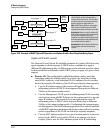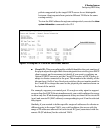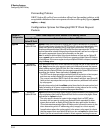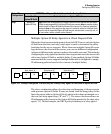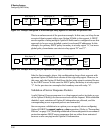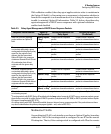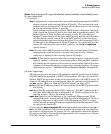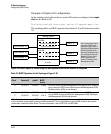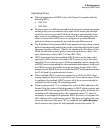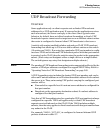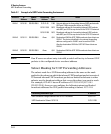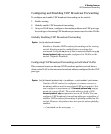
X
IP Routing Features
Configuring DHCP Relay
Example of Option 82 Configuration
In the routing switch shown below, option 82 has been configured with mgmt-
vlan for the Remote ID.
ProCurve(config)# dhcp-relay option 82 append mgmt-vlan
The resulting effect on DHCP operation for clients X, Y, and Z is shown in table
3-6.
Management VLAN
VLAN 300
10.39.10.1 (secondary IP)
10.38.10.1 (primary IP)
VLAN 200
10.29.10.1
10.28.10.1
VLAN 100
10.15.10.1
Client “X”
DHCP Server “A”
DHCP Server “B”
Client “Y”
Routing Switch
Client “Z”
DHCP Server “C”
On a routing switch that is
the primary DHCP relay
agent for a given client, if
the (optional) Management
VLAN is selected as the
Remote ID suboption and is
also multinetted, then the
Remote ID for the client
DHCP requests is the
primary IP address of the
Management VLAN.
Figure 3-25.DHCP Option 82 When Using the Management VLAN as the Remote ID Suboption
Table 3-6.DHCP Operation for the Topology in Figure 3-25
Client Remote ID giaddr* DHCP
Server
10.38.10.1 10.39.10.1 A only If a DHCP client is in the Management VLAN, then its DHCP requests
can go only to a DHCP server that is also in the Management VLAN.
Routing to other VLANs is not allowed.
Y 10.38.10.1 10.29.10.1 B or C Clients outside of the Management VLAN can send DHCP requests
only to DHCP servers outside of the Management VLAN. Routing to
Z 10.38.10.1 10.15.10.1 B or C
the Management VLAN is not allowed.
*The IP address of the primary DHCP relay agent receiving a client request packet is automatically added to the packet,
and is identified as the giaddr (gateway interface address). This is the IP address of the VLAN on which the request
packet was received from the client. For more information, refer to RFC 2131 and RFC 3046.
3-60



